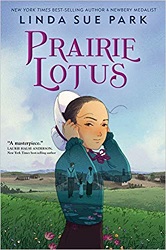
 Prairie Lotus
Prairie LotusReviewed March 23, 2020, from a library book.
Clarion Books (Houghton Mifflin Harcourt), 2020. 261 pages.
Starred Review
2020 Sonderbooks Stand-out:
#2 Children's Fiction
Prairie Lotus is a beautiful story of a half-Chinese girl, Hanna Edmunds, settling with her Papa in a town in Dakota Territory in 1880. They plan to open a dress goods shop. Hanna had learned to sew from her Mama, who died back in California, and dreams of also sewing dresses for the ladies of the town.
But Hanna encounters lots of prejudice for being a “Chinaman.” The people of the town don’t want to send their children to school with her, and even people who seem nice ask terribly ignorant questions. So besides trying to make friends in a new town, missing her Mama, and trying to make the shop a success, Hanna hopes that people will even allow her to live there.
Hanna has some encounters with some Indian women and children. She sees the settlers' attitudes toward Indians with the perspective that these are people who look like she does, with black hair and dark eyes.
I couldn’t help but love Hanna, with her passion for making beautiful dresses, her willingness to think the best of people, and her determined spirit. Here’s a book that all children can picture themselves as being part of, experiencing a town on the frontier.
Prairie Lotus is written as both a tribute and an answer to Laura Ingalls Wilder’s books. The author notes in the back that she grew up loving those books.
Even at the height of my passion for those books, there were parts that I found puzzling and distressing. The character of Ma was most problematic. Her values of propriety and obedience over everything else seemed to me both misplaced and stifling.
And Ma hated Native Americans. In several episodes throughout the series, she expresses that hatred. While I could not have articulated it at the time, I harbored a deeply personal sense of dismay over Ma’s attitude. Ultimately it meant that she would never have allowed Laura to become friends with someone like me. Someone with black hair and dark eyes and tan skin. Someone who wasn’t white.
I appreciated that she did a lot of research to make sure she gets the encounters with Native Americans right.
I also chose to include a few lines of Dakota dialogue. I felt strongly about including those words in an effort to counteract previous generations of innumerable children’s books that have never depicted or even acknowledged Native languages, and the stereotypes of Hollywood that reduced Native communication to grunts and pidgin.
She concludes the Author’s Note like this:
Prairie Lotus is a story I have been writing nearly all my life. It is an attempt to reconcile my childhood love of the Little House books with my adult knowledge of their painful shortcomings. My wish is that this book will provide food for thought for all who read it, especially the young readers in whose hands the future lies.
She has not only succeeded in this goal, but she’s also written a main character her readers will love. They will imagine themselves back in LaForge, wanting to be Hanna’s best friend. But children won't feel cut off from that imagination by the way they look.
